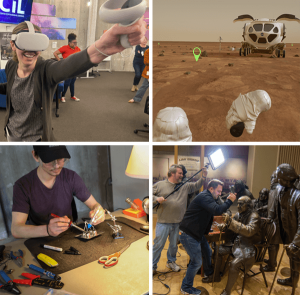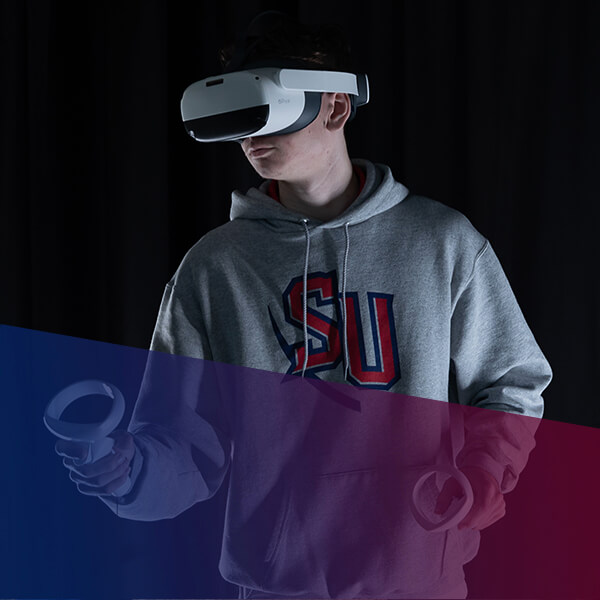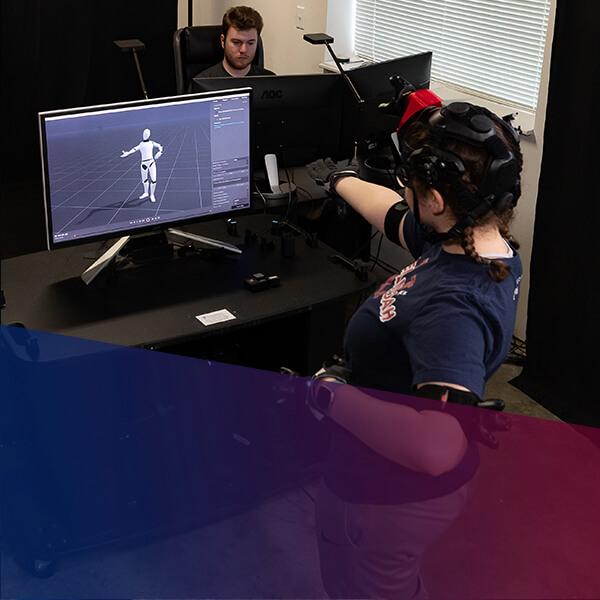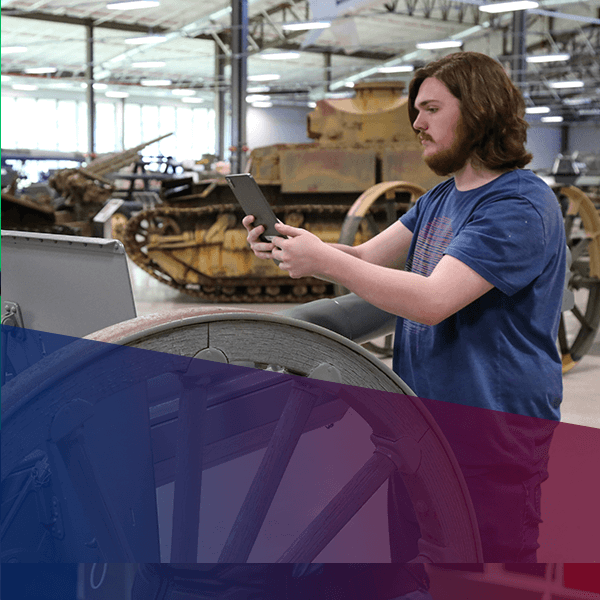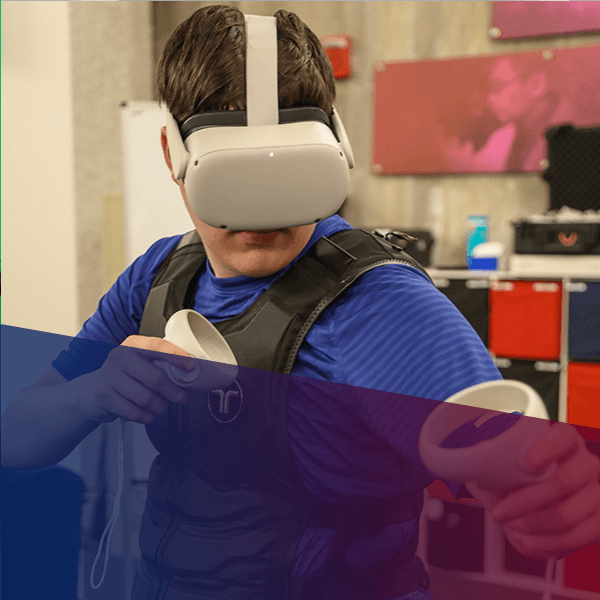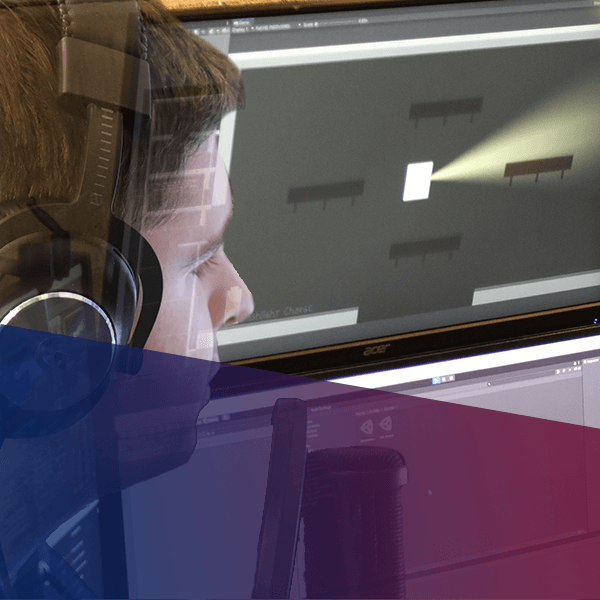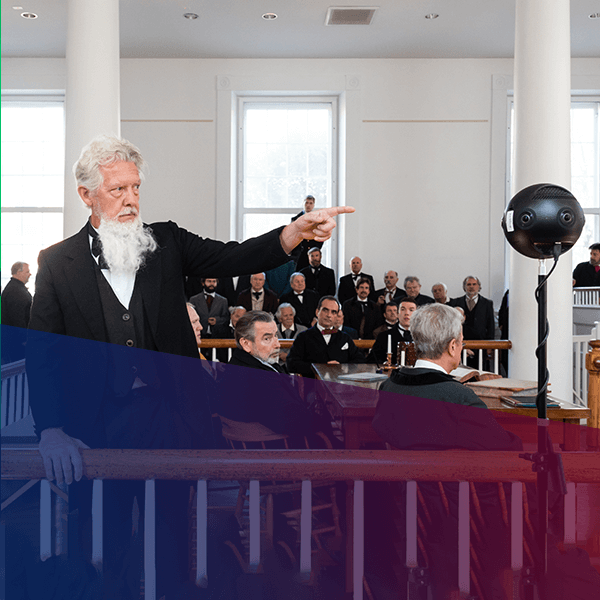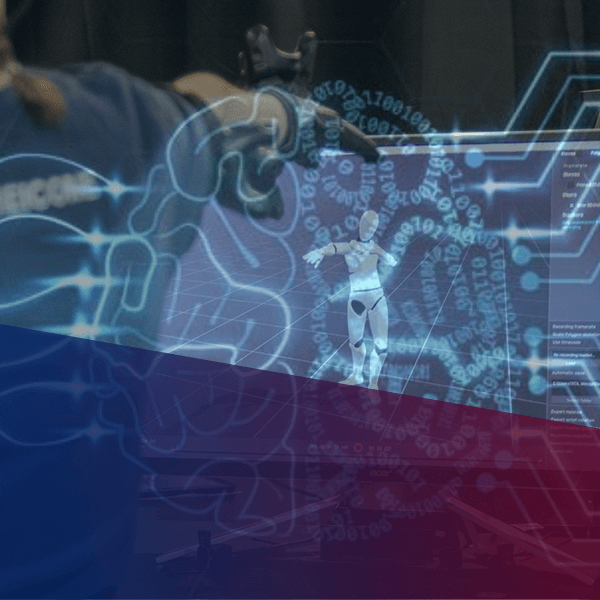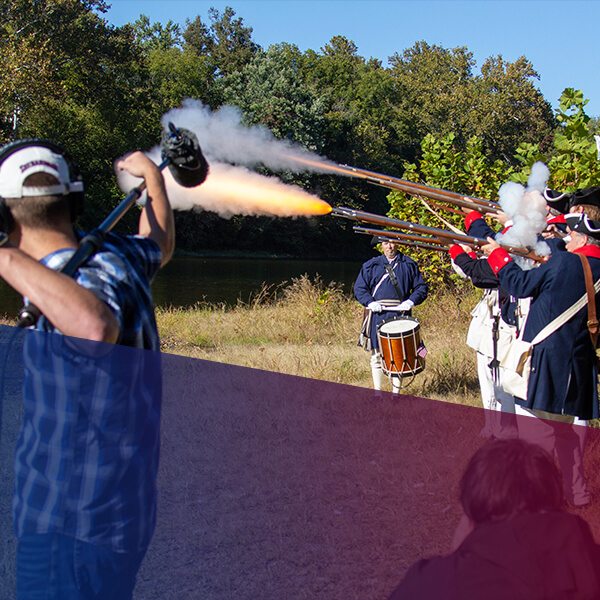Degree Programs
As either a Bachelor of Arts (BA) or Bachelor of Science (BS) student, you can focus your energies on the tools and technologies that best match your interests and career ambitions. In either program, you’ll learn important professional skills like self-initiative, effective teamwork, project conceptualization, system documentation and public speaking. You’ll be involved in impactful, real-world projects through courses, capstones, independent work and undergraduate research.
The skills you learn are transferable to many areas beyond VR and AR, including software engineering, game and simulation design, 2D and 3D graphic design, web development, screenwriting, project management, UI/UX, and system evaluation.
Minors & Certificates

SCIL infuses AR and VR simulation models into teaching and learning experiences.
Shenandoah University’s Center for Immersive Learning (SCiL) is a state-of-the-art AR/VR/XR lab that supports the Virtual Reality Design programs, minors, and the university as a whole. Our student workers are integral to SCiL operations, support and maintain the lab, and work on SCiL projects.
SCiL has nearly 40 VR/AR headsets available for regular student use, including the Varjo Aero, HTC Vive Focus 3, HTC Flow, Pico Neo 3 Eye, Valve Index, Oculus Quest 1 & 2, Magic Leap, Hololens 1 & 2, HP Reverb, and more. SCiL also hosts more than a dozen high-performance workstations where students are able to design and develop for all of the available equipment in the lab.
Additionally, SCiL hosts a suite of audio and video equipment for 360 and traditional video production, including an Insta 360 Pro camera, GoPro Max 360 cameras, DSLR photographic cameras, field audio recording equipment, light kits and accessories. This equipment is available to students starting in their first semester.
SCiL has a performance/motion capture studio for recording fully rigged 3D character animation and a professional sound recording studio for dialogue recording and foley work. Other lab equipment includes 3D printers, haptic devices, omnidirectional treadmills (ODT), Arduino electronics kits, Kinect and Ultra Leap gesture tracking IR systems, collaborative work spaces, and open areas for developing and testing multi-user and “arena-scale” VR applications.
SCiL frequently works with the university, the Winchester community, government agencies, and other clients to develop AR, VR, and 360 video productions, giving students hands-on experience in professional development:
-
- The Great Experiment – a high-fidelity recreation of Philadelphia’s Independence Hall featuring a VR recreation of the Founding Fathers and their debates at the 1787 Constitutional Convention.
- French 75 VR – an educational, multiuser VR recreation of a crew-operated WW1-era field artillery piece.
- Take CoVR – a fast-paced, multiplayer game where players compete in seasonally themed snowball fights, balloon throwing and other activities. Developed in partnership with SU Student Affairs.
- NASA Mars XR Challenge – a VR recreation of scientific data collection tasks on Mars.
- Atmosphere of Hate – a recreation of a 1960s Civil Rights Era lunch counter sit-in.
- Haunted Hospital – an immersive haunted house experience developed entirely by students.
- John Brown Trial – a recreation of the trial of pre-Civil War abolitionist John Brown using 360-degree VR video in collaboration with acting students, the university’s history department, and outside organizations.
- SCiL Photo Showcase – an interactive, gesture-based photo installation developed by first-year students.
- Through Their Eyes – an augmented reality mobile app showcasing elements of the Cool Spring Civil War Battlefield.
- Nursing Simulation VR – an international collaboration with the Arab-American University of Palestine (AAUP) to create an immersive VR nursing training simulation.
- Winchester Tourism VR – an interactive VR application to visit local tourism attractions through the medium of 360 video.
- AR Student Center Mural – a mobile augmented reality experience based on artwork at the Brandt Student Center.
- French 75 VR – a virtually constructed WWI artillery cannon placing users at the command of a French 75 Cannon operator
- Sons of the American Revolution Musket Drill Production – a video production that included drones and 3D videography to help a national historical society demonstrate revolutionary war musket drills for memorial services and historical reenactments.
Our Students Are Saying…
Current Students
Brynna Strader, ’23 | B.A. Virtual Reality Design, Game Design Minor
The Bachelor of Arts has expanded not only my knowledge but the very way I think about design and problem-solving.”
Luke Yager ’25 | B.S. Virtual Reality Design, IT minor
Shenandoah University’s VR design program is unique because it offers students a wide range of industry tools to get hands-on experience with. I have gained a lot of knowledge in both hardware and software design during my time in the Shenandoah University VR program.”
Yohan Joung | B.A. Virtual Reality Design
Shenandoah University’s VR Design BA program is very flexible and packed with new ways to learn from an ever-growing industry. Being a full-time staff member and a part-time student is a learning experience and I am grateful to Shenandoah University for giving me a chance to learn new and exciting technology that revolves around the VR industry. My favorite part is learning the augmented side of VR, and I am excited to learn new things ahead!”
Recent Graduates
John Michael Ulbrich ’22 | B.S. Virtual Reality Design
Small classes let you know your professors well, and get each student so much one-on-one time. It’s amazing, so incredibly amazing… and they’re so open-minded. I literally wrote up a grant proposal once for how we could do drone-based 360 videography, and it got accepted!”
Cole Herndon ’22 | B.S. Virtual Reality Design
Shenandoah University has taught me more about AR/VR than I had ever imagined. With small class sizes, knowledgeable professors, and projects that apply course content as well as foster knowledge, Shenandoah University has allowed me to grow both as a person and in my field. To be a part of a new field that is only set to continue to grow is an exciting feeling and what I’ve received from Shenandoah University is invaluable and will continue with me for the rest of my life.”
Orion Patrick Tighe ’22 | B.S. Virtual Reality Design, IT minor
The VR design program is unique to me because of the way it teaches a lot of VR. There is a large focus in the B.S. program on the programming aspect of VR, mostly concerning how you construct interactions and environments within Unity (a content creation tool). However, the VR program as a whole also covers many of the important aspects of what virtual reality does, such as immersion, presence, and the sense of being there that comes with wearing a headset.”
Experience Amazing Things
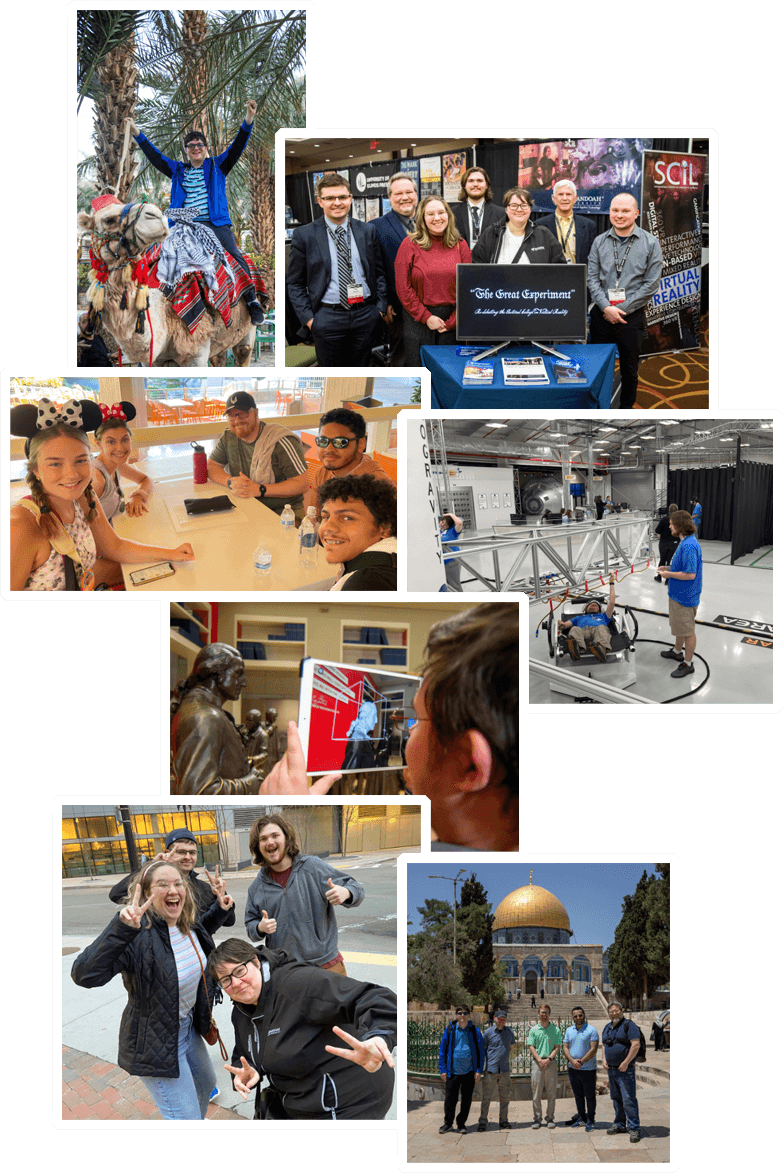
I t’s important to get out of the headset from time to time! We offer exciting opportunities to engage with the real world through trips, research experiences, projects, and more. In past semesters, our students have…
Traveled to Israel and Palestine as part of a collaboration with Arab-American University of Palestine (AAUP). We saw the old city of Jerusalem, visited Hisham’s Palace in Jericho, saw the Dome of the Rock, and rode camels.
Visited Disneyland and Kennedy Space Center (KSC) in Florida as part of a Global Experiential Learning trip focused on STEM education and experience design. We toured behind the scenes at Disney, participated in astronaut training, and watched a Falcon 9 rocket launch live from Cocoa Beach.
Collected 3D-scan data of World War One artillery systems at the Ft. Lee Training Support Center and the North-South Skirmish Association range in Winchester, Virginia. We got to 3D scan real artillery shells and range-finding systems, explore a huge warehouse of historical military equipment, and fire a French 75 cannon.
Attended the Organization of American Historians Conference in Boston, Massachusetts. We showcased The Great Experiment, visited MIT and Harvard, and solved crazy escape room puzzles.
Visited Independence Hall in Philadelphia to capture images and 3D-scan data for The Great Experiment VR recreation of the 1787 Constitutional Convention.
Contact Us
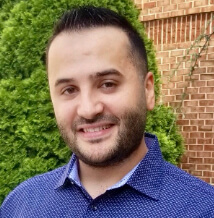 Mohammad F. Obeid, Ph.D.
Mohammad F. Obeid, Ph.D.
Associate Professor, Virtual & Augmented Reality Design
Program Director, Bachelor of Science Program
mobeid@su.edu | (540) 535-3414
 Nathan R. Prestopnik, Ph.D.
Nathan R. Prestopnik, Ph.D.
Associate Professor, Virtual & Augmented Reality Design
Program Director, Bachelor of Arts Program
nprestop@su.edu | (540) 535-3477

